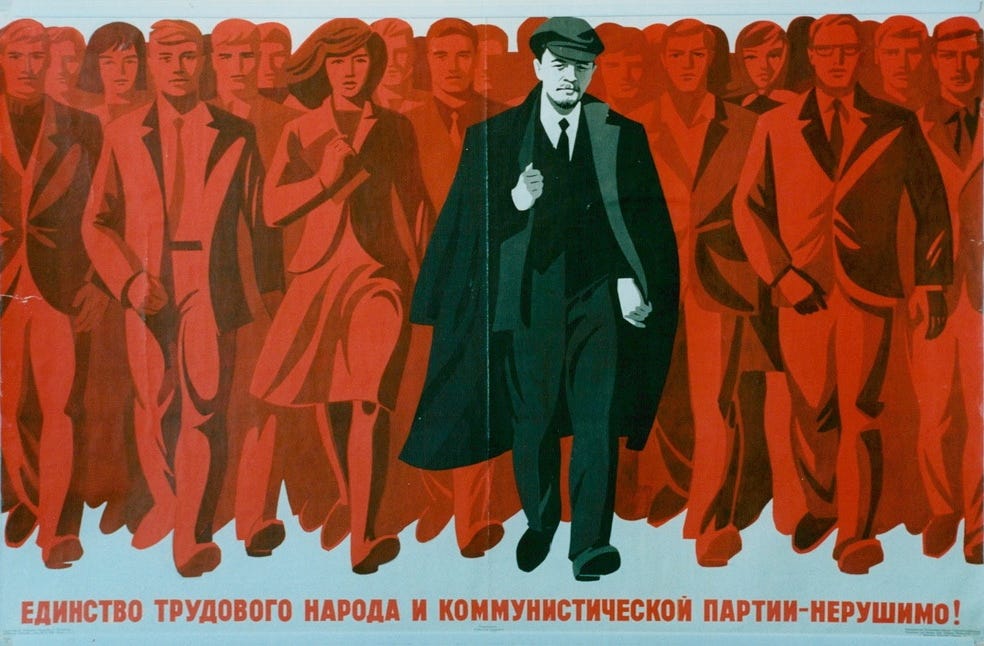The Art of Reluctant Entrepreneurship: Business as a Bubble for Designers
Conscious and creative entrepreneurship as a force for liberation

Dear Designer,
I never wanted to be a designer. And I never set out to run a design studio.
While I was always interested in design history, my training at college and graduate school was as an artist — a painter and photographer, primarily. I essentially triple majored in college — I was pre-med until junior year and graduated with a degree in visual art and in English literature.
After receiving an MFA, I went away for a year on a Fulbright to study art and Jewish culture in Poland. My goal and real hope was to find a job teaching art at a college or university. My academic training and early practice was purpose-built to support other artists in their efforts to become… artists. This is not unlike a lot of academic training, which perpetuates systems of study. In my formal education, I was steeped in critical theory, post-structuralism and too much semiotic close reading.
When I moved to New York, I spent my first five years there as an artist, painting and drawing and working part-time at various jobs, and eventually I worked full-time at a foundation, painting whenever I could, at nights and on weekends. I scraped by but most of being an artist then was joyful and meaningful.
I wanted nothing to do with business, working at a business, or running a business. I was suspect of and about business and nearly anything entrepreneurial.
My business baby was born in a big oven
But the late 1990s saw an explosion in creative endeavours, mostly in advancing the early web. I found a slow job at a fast-growing digital agency called OVEN as a researcher and a writer. And I hung with the cool kids who were my age — the designers, illustrators and coders who were literally creating this new thing called Internet. Those were incredible exciting and heady days, inventing how the web worked as we went, making digital moves, and designing spectacular sites that were used by millions and millions of people. (In fact, I continue to be amazed at this one fact — that one’s digital work is immediately visible to anyone, anywhere, anytime thanks to the good graces of an always-on world wide web.)
But in all of that time, I always had — and continue to have — a suspicion about and even disrespect for business and those who operate in business. And I don’t say this lightly, as after working at OVEN for a few years, I ran a respected, award-winning and profitable design studio for 20 years.
And, yes, during all of that time, I often felt like I either should not be running a business or I was doing something that went against my most deeply held values. The emotional calculus was impossible.
Business = profit. Business = exploitation. Business = manipulation.
These tropes (partly derived from academia) were carved into my skin. Business was something done by people to other people. Business was responsible for the world’s problems. Business didn’t work for most people. I didn’t feel this way all of the time, of course, but it was often enough to occasionally feel insecure my own place in the world.
I know I’m not alone here. Over those 20 years of running my design studio, I met so many other people who started with that art form that they truly loved — designing, coding, printing, drawing, writing, crafting, sculpting — and they ended up pouring their lives into their business. Nearly all of them built remarkable, far-reaching and innovative companies built around their passion while, at the same time, often feeling suspect about that filthy lucre, the profit-motive, and the nature of capitalism more generally.
In fact, I will say that the folks that were most suspect of the concept of “business”, the ones that most despised the depravities of contemporary commerce, the ones that were most Marxian in their economic philosophy, the ones that believed that we will one day achieve a better social order based on the premises of universal human rights, anarchist culture, and the emancipation of all peoples — these were the folks who were most successful at running a business.
At least, those are the folks that I most admired and to whom I most gravitated as a founder and studio owner. Even during those weeks of intense internal scrunity and self-doubt, I loved being among other folks who were using their business to create social change, to support others in their pursuit of happiness, and to heal the planet.
So what? Why does any of this matter?
I’m saying all of this for two reasons — one personal and one instructive. First, I’ve never publicly admitted my own misgivings about the ideology and contemporary praxis of “business” before. Sure, I’ve spoken with friends about it and certainly, my poor spouse knows how rent I was about running a for-profit enterprise over many years.
But, here’s what is important to know. Owning a business is a masterful means to a meaningful end. It allowed me to have control over the external workings of my existence — my day-to-day activities, the kinds of work that I would take on, and the types of people I would invite into my life. It gave me the license to create objects and to have options. It offered me an expansive view of practical and theoretical possibilities, opening up doors upon doors to new conversations and novel ideas. Importantly, it allowed me to create — for the most part freely and frankly — daily. And business paid for my labours, supporting me and those around me.
Running a small business is a legally sanctioned road to being disencumbered.
I have said this to many folks: I saw my design studio as a bubble within which I could offer protection and possibility to myself, my family and those I invited in. The bubble shielded me from some of the worst of the market’s reckonings. The bubble offered provisions and, yes, privilege. I filled it with my own breath (and hot air) and the breadth of my interests and values .
It was not easy. Running a business is incredibly, incredibly difficult — and even more so if you want to do it with an ethical hand.
Business is also a trojan horse
But the second reasons is that, at this particular junction of history, when individual freedoms may become fewer and farther between, we might find that running a business is the trojan horse to personal and social transformation.
The market economy values and supports entrepreneurs. As the political tides turn and we encounter more authoritarian impulses in the United States and elsewhere around the world, capital will continue to support entrepreneurialism and will generally protect its practitioners. Yes, the most monopolistic companies will thrive — but even their mandate requires the continued generation of new products and ideas — and especially those from small businesses. TikTok, ChatGPT, and Amazon, for instance, may continue to metastasize but, for better and worse, it will be in conjunction with the growth and contribution of small business owners and their creative endeavours.
Within a small business, within the bubble, you can act.
You can support other small businesses, take on clients from vulnerable populations, deliver your ideas to receptive communities, and create new products that people will enjoy and even adore. There is a level of latitude in running a business that you will not achieve while working for someone else. Yes, sometimes it will feel like you are free-falling. It is scary as all f*ck. But when you come down, when you land — and like all ripe apples from rampant trees — you inevitably will, you will have the rarest of things: the capacity to wonder.
I encourage you, dear designer, to start your own business. It can be small. Keep it simple — and sympathetic to your needs. Allow it to take radical roots, to grow high so that its canopy might connect to other covers.
There is beauty in constraints and in contradiction. And I know I sound like the Voice of America over here. But business, operated consciously, can be a vital vehicle for independent creativity, influence and authentic social action, especially in a time of cultural contraction.
Yours,
Image of the week

The picture speaks for itself, right? A 1920s poster from Soviet Russia that shows a young Vladimir Lenin leading a flock of nattily dressed… business people? The State Museum of Political History of Russia dates this to the 1960s, which becomes obvious when you look at the style of clothing. The Soviet Union frowned on entrepreneurship as the precursor to capitalism and ownership of private property. By the 1960s, cracks in that wall were starting to appear, music and dance were more liberally allowed, and the system slowly capitulated to allowing greater personal freedoms. This posters give license to what was likely a cool advance in social liberty.
Quote of the week
I wasn't sure I was an artist, so I thought maybe I just was throwing ideas out for people to consider.
~ artist Jenny Holzer
Thank you for reading, dear designer. Sharing? A button:
If Dear Designer was forwarded, you can get your very own subscription here. This newsletter is free and so are you.






FastCo article on state of the corporate market for "design leadership". Gives context for the 'role of designer' conversation. Lots of quotes and likely some of the names will be familiar. Some harkening back to the gold rush early Razorifish days.
"The big design freak-out: A generation of design leaders grapple with their future: Did business really break up with design, or did it just break up with a generation of design leadership? "Robert Fabricant, FAST COMPANY, 2-15-2024
https://www.fastcompany.com/91027996/the-big-design-freak-out-a-generation-of-design-leaders-grapple-with-their-future
Some Thoughts Upon Reading the Latest of Your Weekly Provocations:
I was a member of the Park Slope Food Coop in Brooklyn for many years. As my monthly work assignment I did a project that was, practically speaking, a business process reengineering gig, and then later, I sat on the Personnel Committee, which was functionally the Human Resources function for the business. The handful septuagenarian employees that ran the coop - and I write this in awe and as a compliment - were perhaps the most ruthlessly efficient, effective, and creative capitalists I have run across my decades of wide-ranging professional adventures. I am a big fan of hacking our prevailing economic system to form and connect bubbles of civility, sustainability, justice, and inclusion... I attended art school with Andrew, I worked in a rival digital strategy startup during the internet gold rush of the late 1990's [Andy, OVEN vs. Me, Razorfish], and I have spent the last couple of decades as an unintentional social entrepreneur. Oooh so unintentional...
I DUNNO
I do not have a point, a lesson, or a Moral of the Story here. Intentionally so. I recently left a co-founder/co-leader position at a pro-reparations LLC, and I am enjoying a rare moment of pure intentional not-knowingness: What's the best way to navigate and participate in the end game of global consumer capitalism? What are points of highest leverage and my best role in relation to each? What role do the lenses/practices/communities of practice related to mutual aid/social movement/Just Transition have to play? How fruitful is the emerging interest in individual and collective grieving? Fascism/Authoritarianism/White Supremacy/Nativism, WTF? /For all this and more, I am indulging in the luxury of officially and explicitly as a matter of policy, Not Knowing. I am curious. I am fired-up. I am deeply committed to love and justice.
And for now, right now, I Don't Know.